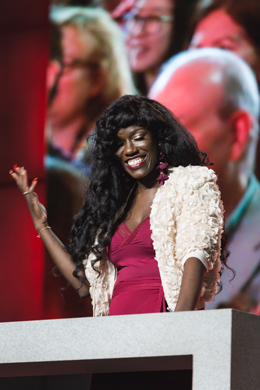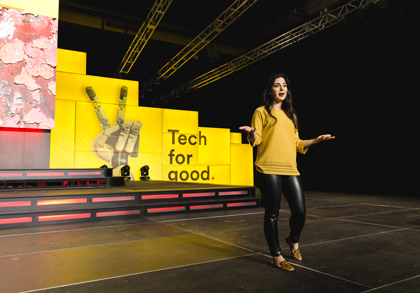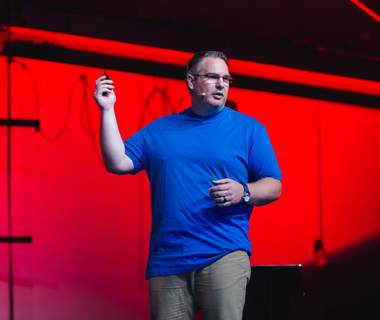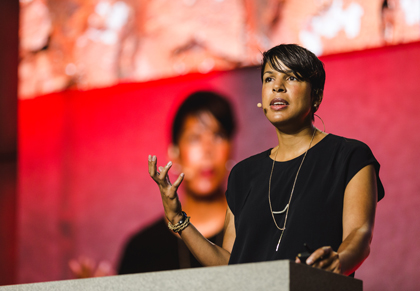BY CRAIG DANIELS AND KELLY PEDRO
Making a difference. Making lives better. Leaving no one behind. Hope. Trust.
The final day of True North, the conference about “tech for good,” grabbed the torch from the day previous, burned incandescent, tackled issues large and small, and then, with a sigh, was extinguished with these words:
“This the end, but it is only the beginning,” said Talia Sanhewe, the event’s MC. “Thank you for having the conviction that tech is for good.”
True North, conceived as an opportunity for frank talk about the direction of tech at a time when technology and tech companies have come under scrutiny and criticism, dove into big issues for more than two days, amplifying themes like diversity, inclusion, human connections and using data and tech to do good, and pledging to carry on the work.
“It’s not a conference. It’s the beginning of a movement,” said Communitech CEO Iain Klugman, who thanked the more than 2,000 attendees for carving “out a white space for meaningful conversations.”
Wednesday’s meaningful conversations opened with the publishing of an aspirational “Tech for Good Declaration,” a living document and a set of guiding principles – written by True North attendees during workshops on Day 1 of the conference – that Canadians can continue to amend. It was unveiled on the main stage by Canada’s former Governor General, David Johnston. Its principles set the tone for the day:
- Build trust and respect your data.
- Be transparent and give choice.
- Reskill the future of work.
- Leave no one behind.
- Think inclusively at every stage.
- Actively participate in collaborative governance.
- Continuing the discussion: Questions that still need answers.
And with that, it was on to the day’s speakers, who provided a real-time witness to the declaration’s ideals.
First up on the main stage at the Lot42 event centre was Bozoma Saint John, the Chief Brand Officer at Uber, who spoke about tech as a way to connect with our humanity and bridge relationships.

Bozoma Saint John, Chief Brand Officer for Uber,
onstage at True North 2018
(Communitech photo: Harminder Phull)
Saint John faced questions from both the event’s MC, Talia Sanhewe, and the audience that were centred around the unflattering spotlight that Uber has come under, in no small part due to toxic behaviour of its former CEO, Travis Kalanick. Saint John joined Uber in the midst of the controversy, a company that was ""beleaguered with scandal,” she said, “and challenges that seemed too big to overcome.”
Why join? asked Sanhewe.
“Why? My mother asked the same question. Saint John said the career opportunity inherent in helping rehabilitate the reputation of the company that had fallen “lower than the bottom” was one reason. Another was to show that “talented women and people of colour deserve” important roles, “not just because it’s the right thing to do, but because we’re actually capable.”
With that the Lot42 audience erupted in applause.
Arguably the most inspiring talk of the day was delivered by Globe and Mail investigative journalist Robyn Doolittle, whose multi-part series titled “Unfounded,” about sexual assault victims whose cases were not properly investigated by police forces across Canada, changed police procedures and generated the will to reopen previously dismissed cases. Her series brought justice for many victims.

Investigative reporter Robyn Doolittle inspired the audience with her talk on
her Globe and Mail series on police failure to investigate sexual assaults.
(Communitech photo: Harminder Phull)
Doolittle said that it was data, and the power of the Internet, that gave teeth and relevance to her work.
And she said that because the Internet offered a way to present the data in a meaningful, accessible way, “small community newspapers and radio stations picked up on what their community was doing and held their police services to account.”
Perhaps the most organic and engaging of day’s conversations – certainly the one with the most pop-culture wattage, was a panel called Stranger than Fiction: The Future of Entertainment and Tech.
The session featured writer, producer and broadcaster Charlie Brooker, creator of the popular TV series Black Mirror; Kate Darling, robot ethicist from the MIT Media Lab; and Oscar-winning filmmaker Spike Jonze, speaking in a roundtable moderated by author and lawyer Mark Sakamoto. They engaged in an easy, conversational examination of the way society takes its cues from tech, and the way tech takes it cues from art.
“I didn’t set out to write a film about the state of where we are. I was living in the state of where we are,” said Jonze about his feature film, Her. He turned to to Brooker: “Do you write your anxieties?”
And Brooker responded: “We’re trying to unsettle people and it’s probably easier to unsettle people if your story has one foot based in reality.”
The preceding session, featuring the publisher and CEO of the Globe and Mail, Phillip Crawley; Harleen Kaur, CEO of media app Ground; and Mathew Ingram, Chief Digital Writer at the Columbia Journalism Review, tackled the vexing problem of conducting journalism in the fake news era.
“Ultimately what does your audience expect?,” asked Crawley. “They need to be able to trust what you’re doing. Ultimately, your own audience will tell you if they believe in what you’re doing.”
To which Ingram said: “The whole question of trust is problematic. People trust what they want to hear.”
On Stage B, meanwhile, Richard Yim, co-founder of Kitchener-based Demine Robotics, which uses technology to safely remove landmines, wrapped up the morning portion with a talk about using tech for social good. Yim said we have to understand problems from the perspective of those who deeply know them.
“This means not finding a solution by reading about the problems in the newspapers, but it’s about living the problem . . . really understanding the core process,” said Yim, who was born in Cambodia and moved to Canada at age 13.
That’s why, he said, when he travelled to Cambodia to test out a robot that would safely excavate landmines, he decided to become a certified de-miner himself.
“Understanding and watching a de-miner do work is one thing but when you’re on the ground and digging out the landmine yourself, that’s when you truly understand the problem,” he told the crowd.
In other Stage B highlights:
- Mallory Greene of Wealthsimple said tech for good involves bold, innovative partnerships, leveraging technology and thinking big, but starting small. “I ask that you join me in making a change, making the world a better place and using your technology to do that,” Greene said

Loren Padelford of Shopify on Stage B
(Communitech photo: Meghan Thompson)
- Loren Padelford, VP and General Manager of Shopify’s Waterloo operation, talked about the barriers to opening businesses and the need for more voices in business. “We can’t let the world be run by a few voices. We need many voices,"" he says. “Today we need to choose to help entrepreneurs. Today we need to choose to do good.”
- Dr. Sonny Kohli, a physician and co-founder of Kitchener-based Cloud DX, which creates digital tools to monitor health and wellness, challenged the Waterloo Region community and those beyond Canada who are running tech companies to think about the concept of tech for the greater good.
- Anne Connelly, a blockchain professor at Singularity University, took a different approach: “I would challenge you all to go out and buy $5 worth of Bitcoin today. Participate in something you don’t understand but are excited about.”
- Mary Pat Hinton, CEO and co-founder of Emmetros, a Waterloo-based startup that uses technology to help people living with cognitive issues maintain their independence, talked about hiring people with passions that reach beyond the workplace. “If you commit to the whole person inside of work and outside of work, you will have a joyful team,” she said, urging those in the audience to “seek out and hire those difference makers in your community.”
- Tim Jackson, CEO of SHAD, a non-profit Waterloo-based enrichment and entrepreneurship program for high school aged youth, moderated a panel on inclusion and diversity. “To be inclusive, you need to give (women and those of diverse backgrounds) the chance to rise to the top as well — not make them work twice as hard,” said Yesenia Cheekinew, an indigenous woman. “That’s diverse, but not inclusive.”
- Michael Denham, CEO of BDC, outlined how the financial institution was committing to diversity in a business setting. BDC, a self-funding Crown corporation that provides financing, advice and capital to entrepreneurs, has set up the biggest fund of its kind in the world – $200 million to invest in women in tech, said Denham. “Diversity is good for business. Diversity creates wealth for all of us. Diversity is good for Canada,” he said.
- Taylor Bond and Jeannette Stock of Venture Out, an organization that’s responsible for Canada’s first tech conference for LGBTQ people, spoke about LGBTQ inclusion in the tech community. “You can’t be what you can’t see,” Bond said of Venture Out’s role in connecting LGBTQ+ people in tech to career opportunities, role models and each other

Catherine Bracy on the main stage at True North
(Communitech photo: Harminder Phull)
Earlier in the day, back on the morning’s main stage, Catherine Bracy of the Bay Area-based TechEquity Collaborative, laid out in stark terms the extent to which tech firms have squandered goodwill capital in the eyes of the public. She said when Uber decided to open an office in her neighbourhood she was unprepared for the amount of pushback, leading her to realize that a tipping point had been reached. Why? Real estate prices were too high, generating a housing crisis, the existing residents had been left behind by the tech community and its wealth, and that the perception was that the tech community didn’t care about ordinary people.
That realization launched her into her current role with a mission to do three things: “We educate. We connect. We activate,” she said. “We certainly haven’t come close to solving problems in our own backyard.”
Other notable discussions:
Linda Hasenfratz, CEO of manufacturing company Linamar and Canadian Chair of the Canada-United States Council for Advancement of Women Entrepreneurs and Business Leaders, spoke about STEM and the need for tech grads and including women. “The supply [of tech engineers] does not meet the demand,” she said. “We need to get as many young people engaged in STEM as we can. What’s clear is, that means we need to tap into 100 per cent of our population. That’s where diversity and inclusion comes into play – to find both men and women who have an aptitude for STEM.”
And Day 2 on Stage B wrapped up with Mallorie Brodie, co-founder of Bridgit, a Kitchener-based construction tech company. While many might not associate a traditional industry such as construction with modern technology, Bridgit is defying the odds.
That’s because Brodie and her business partner Lauren Lake – who started Bridgit while they were still university students – focused on research and creating a digital tool that filled a need.
“It’s possible to get traditional industries to use modern tech. You just need to take the time to listen to your customers and figure out the way they want to use it,” said Brodie.
Perhaps a fitting coda for the event was provided in its final moments by Brooker. Asked by the moderator of his panel what he hopes technology will deliver in the future, Brooker tapped into and summed up the angst behind True North’s mission and inception:
“I hope we find a way to use tech to be kind to ourselves.”

